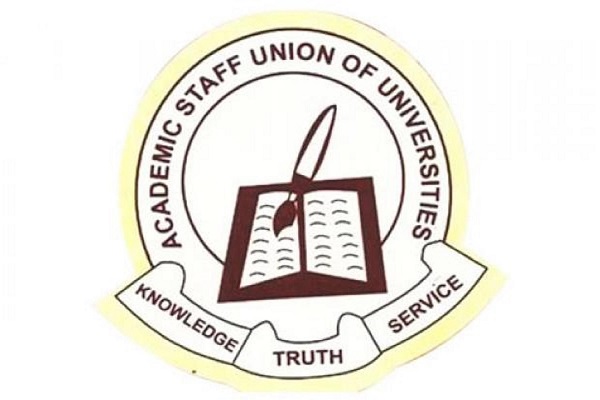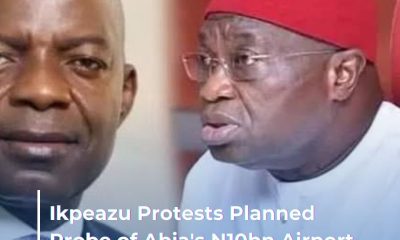News
State Varsity Pro-chancellors Attack ASUU in response to Osodeke’s Remark

Ibekimi Oriamaja Reports
The President of the Academic Staff Union of Universities (ASUU), Prof. Emmanuel Osodeke, recently made a statement in which he branded state universities “quack institutions.” The Committee of Pro-Chancellors of State-owned Universities (COPSUN) expressed disapproval of this statement Wednesday.
While criticizing ASUU’s recalcitrant stance in resolving the current standoff with the government, COPSUN emphasized that it was insulting, contemptuous, and unbecoming for the president of ASUU to refer to state universities as quacks. It described this stance as unpopular and unworkable.
ASUU’s solution to the problem of paying tertiary education in a contemporary, globalized world was criticized as unpopular, outdated, outmoded, and impractical in a statement released by the Secretary of the Committee of Pro-Chancellors of State-owned Universities, Marcus Awobifa.
This occurred at the same time as ASUU’s National Executive Council (NEC), which was meeting in Abuja, launched an indefinite strike after six months of the shutdown of public universities, stating that its agreement with the federal government had not been satisfactorily carried out.
State universities are currently debating whether to continue their industrial action, but Track News learned yesterday that debate has persisted over ASUU’s resolve to do so.
The Pro-Chancellors continued by saying that they had “read with shock and disbelief a statement made by the President of the ASUU Prof. Emmanuel Osodeke on a television program on Arise News Channel, where he asserted that state universities are ‘irrelevant and quacks.’”
Our initial response was to ignore the President of ASUU’s tendentious, poorly thought-out, and blatantly unconscionable statement, but after some thought, we decided that it was necessary to respond to this rather unfortunate statement in light of the President of ASUU’s position within the Nigerian university system.
“Although COPSUN won’t want to engage in a debate with the leader of ASUU, the Committee wants to clarify the following:
They went on to declare that “the Pro-Chancellors of our state institutions and, in fact, members of the Councils are outstanding and accomplished notable men who had served and still serve this Nation in numerous capacities.”
They claimed that retired vice chancellors, retired generals in the armed forces, retired ambassadors, well-known politicians, and other eminent professionals are among the members of the university councils.
Therefore, they said, “It is arrogant, contemptuous, and inappropriate for the President of ASUU to say that these distinguished individuals are in charge of quackery and irrelevant universities.”
“We feel that now is a good time for ASUU to creatively work with all stakeholders to tinker out a solution that will bring back to the campuses the young men and women who have been insensitively expelled from the institutions for the last six months,” COPSUN remarked.
Additionally, COPSUN pointed out that ASUU’s leadership needed to understand that union membership was entirely optional.
“Therefore, it is not his ill-informed approach and denigration of state universities that will lead to fashioning out creative approaches to avoid existential extinction,” COPSUN said. “Therefore, it is not his approach that will lead to solving the myriad problems confronting university system in Nigeria.”
It claimed that ASUU was competing for primacy with the university councils, who were supposed to be their employers.
Additionally, COPSUN emphasized the urgent necessity to immediately democratize union membership in universities so that everyone has the choice of not belonging and the ability to choose whether or not to do so.
They discussed the devolution of powers on labor, wage, and salary concerns with the flexibility of employers to bargain with their staff, as it is done in other countries where we inherited the university system.
They contend that agreements established between the federal government and its employees in universities and to which state universities are not participants cannot be compelled or pressured to be implemented.
COPSUN continued, “It is time to recognize the federal nature of our government in all things and not only when it concerns salaries and pay.
It advocated for the democratic inclusion of individuals with the freedom to choose whether or not to join a union in university settings.
ASUU members stopped working on Monday, February 14, 2022, in protest of the failure of the federal government to execute the 2009 agreement they had struck as well as their requests for pay raises and approval of the University Transparency and Accountability Solution (UTAS).
The majority of the requests made by ASUU, including the release of N50 billion for the payment of earned allowances for academic and non-academic workers at universities, have been met, according to Minister of Education Adamu Adamu, who spoke before yesterday’s NEC meeting.
Track News learned from trustworthy sources that the government may have contacted the ASUU leadership yesterday, immediately after learning that the union had decided to extend the crippling strike.
The source, who wished to remain anonymous, claimed that other interested parties had also intervened in an effort to stop the lecturers’ announcement of an ongoing strike.
The source, who begged to remain anonymous, responded when asked why there had been a delay in issuing a formal statement on the ASUU NEC resolution: “ASUU is currently consulting with interested parties and as soon as it concludes the consultations we will make our position known to the general public.”
The majority of ASUU’s branches around the country voted in favor of the strike’s continuation since, in their opinion, no progress has been made toward fulfilling the union’s demand.
In a statement released by the union last night and signed by Osodeke, it was said that the NEC had decided that the union’s concerns had not been sufficiently addressed following prolonged discussion of the government’s answer to those demands.
“In light of the foregoing, and after careful consideration of the Government’s up to that point response to the resolution of February 14, 2022, NEC came to the conclusion that the union’s requests had not been effectively answered. As a result, NEC decided to change the roll-over strike into an all-out, permanent strike action starting at 12.01 a.m. on Monday, August 29, 2022.
According to ASUU, the conference was primarily intended to examine progress since its most recent resolution, which extended the statewide strike action for an additional four weeks beginning on August 1, 2022.
In the last five and a half years, when the federal government engaged ASUU in endless, pointless negotiations without a show of the utmost loyalty, it was regretted by NEC that the Union had witnessed a great deal of high level dishonesty.
It stated that a committee headed by Wale Babalakin was established by the federal government in 2017 to rewrite the 2009 FGN-ASUU Agreement.
It was mentioned that Babalakin was replaced in December 2020 by Prof. Munzali Jibril following three years of unproductive negotiations.
ASUU claims that in May 2021, the Renegotiation Committee created and delivered a draft agreement to the federal government.
It is regrettable that the federal government made no significant steps to sign the agreement or start implementation up until February 14, 2022, when the current strike started.
The federal government only reconstituted the committee after the strike started, and Prof. Nimi Briggs was named chairman to lead the government team. This led to the submission of the second draft agreement to the federal government in June 2022 for review and approval, with the two parties signing it within a week. The union also stated that this was done in accordance with the idea of collective bargaining.
However, ASUU claimed that the government was refusing to take into account the recommendations made by the Nimi Briggs committee during negotiations, adding that this amounted to reversing choices made during collective bargaining.
The assertion made by the federal government that it would have to borrow N1.6 trillion to carry out the draft agreement was characterized as being not only spiteful but also fabricated to threaten the union.
The union was then presented with some deplorable, unilateral, and humiliating take-it-or-leave-it offers of compensation ranging from $30,000 to $60,000 per month, it claimed.
While the union was still open to reasonable dialogues, according to Osodeke, it had decided to concentrate on the complete implementation of the 23 December 2020 Memorandum of Action in order to quickly restore labor peace in Nigeria’s public universities.
But yesterday, in response to ASUU’s announcement of an indefinite strike, the Federal Ministry of Labor and Employment wrote to the Education Ministry to inquire about the status of negotiations with the union.
The Ministry of Education got a letter from the Labour Ministry demanding to be provided with the most recent offers made to the university employees, a source at the ministry revealed to THISDAY yesterday.
PANDEF: Sad and Most Unfortunate Extension of ASUU Strike
The Pan Niger Delta Forum (PANDEF) has condemned the six-month-old ASUU strike action’s indefinite prolongation as sad and regrettable in the meantime.
The Forum claimed in a statement released by its National Publicity Secretary, Hon. Ken Robinson, that both the federal government and ASUU had shown insensitivity and blatant disregard for the plight of Nigerian students studying at the country’s federal universities, who have been compelled to stay at home for more than six months.
In the statement, PANDEF expressed concern over the ongoing, protracted strikes by several unions in the country’s university system, particularly ASUU.
The committee noted that ASUU went on a nine-month strike in 2020, and that in early 2021, the Non-Academic Staff Union of Education and Associated Institutions (NASU) and the Senior Staff Association of Nigerian Universities both took similar industrial activities.
It further noted that, overall, from the start of this democratic regime in 1999, ASUU has apparently been on strike for almost 46 months.
This is not a condition that ought to be occurring, claims PANDEF. The federal government and ASUU ought to be aware that their actions are putting not only the future of our children in jeopardy but also the nation’s educational system.
Therefore, in the interest of the country’s future and growth, PANDEF sincerely recommends both the Federal Government and ASUU to take all necessary action to quickly put an end to this situation and allow the students to resume their lectures.
-

 News7 days ago
News7 days agoCooking Gas Price Has Fallen
-

 Sports6 days ago
Sports6 days agoFinidi agrees deal with NFF, names three foreign assistants
-

 Politics6 days ago
Politics6 days agoAtiku Says Tinubu’s Son Is A Director In Company Related To Coastal Road Contract
-

 Politics7 days ago
Politics7 days agoRivers Crisis: I Can’t Bow To Wike, He’s Not God – Fubara
-

 Entertainment6 days ago
Entertainment6 days ago“I Met My Husband Online And I’m Happily Married To Him As The 3rd Wife”– Bimpe Akintunde Says As She Shed More Light On Her Marriage
-

 Sports6 days ago
Sports6 days agoRaphael Onyedika Suspended For Club Brugge’s Conference League Clash With Fiorentina
-

 News6 days ago
News6 days agoIkpeazu Protests Planned Probe of Abia’s N10bn Airport Project
-

 Breaking News7 days ago
Breaking News7 days agoBreaking: New Speaker Emerges Amidst Rivers Crisis




